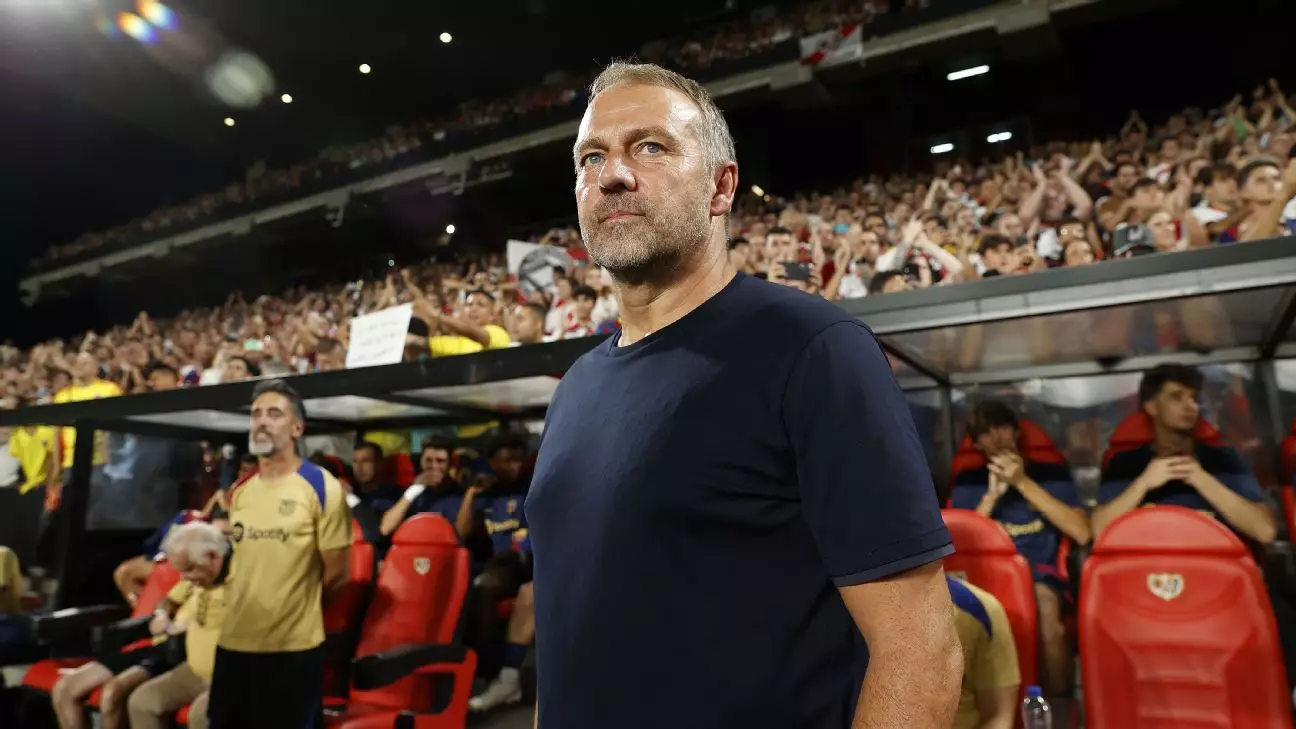In a surprising twist to the current LaLiga season, Barcelona faced a bitter defeat against Osasuna, ending their impressive streak of seven consecutive victories. Under the stewardship of coach Hansi Flick, the team had garnered enthusiasm and expectations for the season. However, the 4-2 loss at El Sadar on Saturday raised significant questions about tactical decisions and squad management. Flick’s admission of personal accountability during the post-match press conference has sparked debates among fans and analysts alike, making it crucial to dissect the factors that contributed to this unexpected turn of events.
Flick’s decision to implement extensive changes to the starting lineup, resting key players such as Raphinha and Lamine Yamal, was aimed at managing the fatigue caused by a dense fixture schedule. While the rationale behind such changes could be justified from a player welfare perspective, it seemed to backfire spectacularly during the match. By allowing five players to make a rare start, Flick gambled on their ability to rise to the occasion, but unfortunately, the results betrayed him.
The ability to rotate the squad is a hallmark of successful teams, yet executing it effectively requires a delicate balance. Flick himself acknowledged that the rash of injuries had limited his ability to rotate players previously. Nonetheless, the experience demonstrated that Barcelona’s depth may not be robust enough to withstand frequent alterations to the lineup.
Dissecting the Defeat: Key Moments and Tactical Missteps
The match commenced with a grave error in defense, leading to Ante Budimir’s opener. This early setback set a precedent for the day’s events, highlighting vulnerabilities that the rotated players seemed unprepared to handle. The second goal came shortly before half-time, exemplifying a failure to maintain focus during crucial moments of the game—a disturbing trend that Flick will need to address.
As Barcelona fought back in the second half, hope surfaced with Pau Víctor’s goal. However, flicking the momentum back into Osasuna’s favor with a penalty awarded for a foul by 19-year-old Sergi Domínguez proved catastrophic. Flick remarked that while some officiating decisions may have been suspect, the team must be held accountable for their on-field performance. This incident illustrates the critical need for both defensive discipline and composure under pressure.
A defeat of this magnitude can have ripple effects on team morale. While Flick maintained a positive outlook regarding the team’s future—expressing confidence about the squad’s direction—there’s no denying that such results can lead to introspection among the players. The challenge lies in channeling disappointment into motivation for the upcoming fixtures against Young Boys in the Champions League and Alavés in LaLiga.
With players like Dani Olmo and Frenkie de Jong set to return after the international break, this upcoming period could stabilize the squad’s psychological state. Yet, the team’s resilience will be tested as they strive not only to redeem themselves but also to solidify their standing at the top of the league table.
Flick’s insistence on making the same changes amid injuries suggests a commitment to player welfare that must be balanced with performance demands. As he prepares the team for a return to action, he must focus on building a cohesive unit capable of both adapting to sudden changes and overcoming the psychological hurdles posed by unfavorable results.
The importance of the next two matches cannot be overstated. Catalonia’s footballing hopes rest on Barcelona’s ability to bounce back and maintain their grip on the league amid stiff competition from Madrid’s top clubs. Flick’s initial success in LaLiga suggested a promising coaching spell. The real test now lies in how he navigates this setback and instills a belief that success is still within reach.
Though this defeat may have momentarily dampened spirits, it serves as a crucial learning experience for Hansi Flick and his squad. To emerge stronger, Barcelona must reflect on tactical choices and defensive robustness while drawing upon the strengths of returning players. As they prepare for crucial encounters looming on the horizon, the team must embrace both the challenges and opportunities that lie ahead, proving that their early-season promise is far from extinguished.
